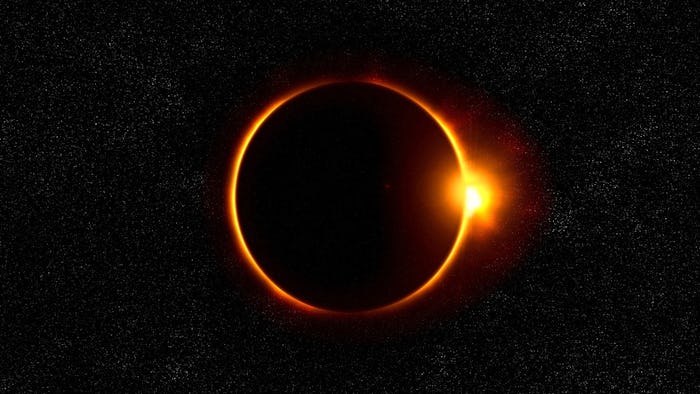Life
What Happens If You Look Directly At A Solar Eclipse? An Ophthalmologist Explains
Unless you're living under a rock, you've heard that a total solar eclipse is coming this way for the first time since 1979. On Aug. 21, the eclipse will begin at 10:15 a.m. in Salem, Oregon, and end at 2:45 p.m. in Charleston, South Carolina. Whether you consider yourself a science buff or not, this will be a pretty exciting day to get your geek on. But exactly what happens if you look directly at a solar eclipse?
In an exclusive interview with Romper, South Florida ophthalmologist Dr. Alan Mendelsohn says, "Looking at a solar eclipse causes a photochemical injury to the retina in the back of the eye. This happens because of a biochemical reaction that occurs with the crucial layer of the retina, the Retinal Pigment Epithelium (RPE) and also the photoreceptors (rods and cones) sustaining damage."
Sounds bad, right? That's because it is. Worst of all, it's completely painless, so there is absolutely no way to know the damage is happening until hours later. Mendelsohn elaborates, "With the retinal damage sustained from the solar eclipse induced toxicity, the patient will notice within a few hours of exposure that he/she has a loss of vision, that objects appear very distorted, and frequently a blind spot will be present that, at times, can be very large, usually affecting the central vision or very close to the central vision."
Is the damage permanent? In most cases and to some extent, yes, although there are lucky exceptions. Mendelsohn says that most people will experience a partial recovery within three to six months of the injury. While some are lucky enough to experience a complete recovery, others suffer from severe permanent loss of vision, usually correlated with the duration of exposure.
Prevention, emphasizes Mendelsohn, is simple and critically important. "Prevention can be successfully achieved by wearing glasses that confirm to the industry standard, which is ISO 12312-2. Any glasses or goggles or disposable cardboard lenses that protect must have the designation that they are ISO 12312-2 approved."
This solar eclipse could be a once-in-a-lifetime event and there's no reason to miss out if you're itching to experience it. But if you'd like to go through the rest of your life with your vision intact, you'd better start finding some eclipse glasses — the sun doesn't mess around.
